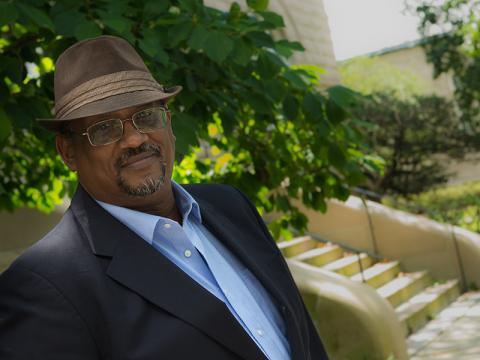Michael Cunningham
Michael Cunningham holds the academic rank of Professor at Tulane University. He has a joint faculty appointment in the Department of Psychology and the undergraduate program in Africana Studies. He serves as an Associate Provost for Graduate Studies and Research in Tulane University’s Office of Academic Affairs. As a developmental psychologist, Mike has a program of research that focuses on racial, ethnic, psychosocial, and socioeconomic processes that affect psychological well‐being, adjustment to chronic stressful events, and academic achievement among African American adolescents and their families. He uses mixed methods in his current research project that includes the study of gender‐specific patterns of resilience and vulnerability in urban African American participants.
Mike started his formal education at Morehouse College in Atlanta. As a first generation college student, Mike started college with the idea of getting an education to find a job. Thus, he started college with a major in Computer Science and Mathematics. His academic interests took a drastic turn during his Jr. year. Not totally happy with Computer Science and Math, he enrolled in an education course where he was required to work in a local elementary school. This “service learning” type experience changed his life. He continued to work in the school after completing the semester’s requirements and also decided to change his career path. Mike became interested in being an elementary school teacher. Thus, he changed his major to Child Development with a focus on elementary education. This also meant that he would have to stay in college for an addition year to complete the teacher certification requirements. This additional year of college is where he began his passion for research. His required senior project focused on the education and Black male student success. This additional year is when he got more involved with psychology classes. Because the Child Development major required many psychology courses, he realized that he could get a minor in psychology while completing the requirements for being a teacher. His Morehouse education ended with a major in Child Development with an emphasis elementary education. He also completed minors in Computer Science and Psychology. At graduation he was also the recipient of the Carnation Award in Teacher Excellence.
Still interested in changing the world one classroom at a time, Mike started the master’s program in Educational Studies at Emory University in Atlanta, GA. Under the mentorship of Dr. Margaret Beale Spencer, Mike’s research career blossomed. He realized that he could not only change classrooms full of bright young minds, but he could also change textbooks and policies associated with underrepresented students by doing more basic research. Thus he continued towards the PhD after completing the MA degree. His research program became more focused on the experiences of African American male adolescents’ perceptions of supports and barriers to their academic successes and identity development. This professional preparation culminated with a postdoctoral fellowship at the University of Pennsylvania.
Mike began is academic career at Tulane with a joint faculty appointment in the Psychology Department and the undergraduate program in Africana Studies (formerly African & African Diaspora Studies at Tulane). Since joining the faculty in 1996 as an Assistant Professor, he has been promoted to Associate Professor in 2002 and Professor in 2012. He served in several administrative roles (e.g., the founding Executive Director of the Center for Engaged Learning and Teaching from 2010-2014, Associate Provost for Engaged Learning and Teaching from 2012-2014, and the Associate Provost for Graduate Studies and Research from 2014 – present.). Mike continues to work with both graduate and undergraduate students. In fact, approximately 80% of his publications are co-authored with current and former students. The publications continue themes that began in graduate school such as gender-specific processes to student success and challenge. Mike has received external funding from several sources including the National Science Foundation, The Mellon Foundation, the Louisiana Board of Regents, and The Department of Education. He has been recognized for his research from the National Research Council. He has received Tulane’s highest teaching award and been designated as a Suzanne and Stephen Weiss Presidential Fellow.
Mike’s current professional service includes serving as an Associate Editor for Child Development and on the editorial boards of Research in Human Development and Journal of Negro Education. He most recently became the incoming Editor for the journal, Research in Human Development. Other contributions to the field is noted by his service on the Society for Research in Child Development’s Governing Council, the Society for Research in Adolescence’s Executive Committee, the Association of Graduate Schools’ Executive Committee, and the Council of Southern Graduate School’s Executive Committee.

Cunningham, M., Swanson, D. P., & Hayes, D. (2013). School and community-based associations to hypermasculine attitudes in African American adolescent males. American Journal of Orthopsychiatry, 83, 244-251. Doi: 10:1111/ajop.12029.
Cunningham, M., Mars, D. E., & Burns, L. T. (2012). The relations of stressful events and future expectations in African American adolescents: Gender differences in parental monitoring. Journal of Negro Education, 81, 338-353.
Corprew, C.S., & Cunningham, M. (2012). Educating tomorrow’s men: Perceived school support, negative youth experiences and bravado attitudes in African American male adolescents. Education and Urban Society, 44, 571-589. Doi: 10.1177/0013124511406534.
Cunningham, M., Kim, A. W., & Papale, N. (2012). Personal characteristics: A situational filter for adolescent development (chapter 4). In G. Creasy, & P. Jarvis (Eds.), Handbook of Adolescent Development in Urban Communities: Resilience in the Neighborhood. In G. L. Creasey, & P. A. Jarvis (Eds.), Adolescent development and school achievement in urban communities: Resilience in the Neighborhood (pp. 38-50). New York: Routledge.


Michael Cunningham holds the academic rank of Professor at Tulane University. He has a joint faculty appointment in the Department of Psychology and the undergraduate program in Africana Studies. He serves as an Associate Provost for Graduate Studies and Research in Tulane University’s Office of Academic Affairs. As a developmental psychologist, Mike has a program of research that focuses on racial, ethnic, psychosocial, and socioeconomic processes that affect psychological well‐being, adjustment to chronic stressful events, and academic achievement among African American adolescents and their families. He uses mixed methods in his current research project that includes the study of gender‐specific patterns of resilience and vulnerability in urban African American participants.
Mike started his formal education at Morehouse College in Atlanta. As a first generation college student, Mike started college with the idea of getting an education to find a job. Thus, he started college with a major in Computer Science and Mathematics. His academic interests took a drastic turn during his Jr. year. Not totally happy with Computer Science and Math, he enrolled in an education course where he was required to work in a local elementary school. This “service learning” type experience changed his life. He continued to work in the school after completing the semester’s requirements and also decided to change his career path. Mike became interested in being an elementary school teacher. Thus, he changed his major to Child Development with a focus on elementary education. This also meant that he would have to stay in college for an addition year to complete the teacher certification requirements. This additional year of college is where he began his passion for research. His required senior project focused on the education and Black male student success. This additional year is when he got more involved with psychology classes. Because the Child Development major required many psychology courses, he realized that he could get a minor in psychology while completing the requirements for being a teacher. His Morehouse education ended with a major in Child Development with an emphasis elementary education. He also completed minors in Computer Science and Psychology. At graduation he was also the recipient of the Carnation Award in Teacher Excellence.
Still interested in changing the world one classroom at a time, Mike started the master’s program in Educational Studies at Emory University in Atlanta, GA. Under the mentorship of Dr. Margaret Beale Spencer, Mike’s research career blossomed. He realized that he could not only change classrooms full of bright young minds, but he could also change textbooks and policies associated with underrepresented students by doing more basic research. Thus he continued towards the PhD after completing the MA degree. His research program became more focused on the experiences of African American male adolescents’ perceptions of supports and barriers to their academic successes and identity development. This professional preparation culminated with a postdoctoral fellowship at the University of Pennsylvania.
Mike began is academic career at Tulane with a joint faculty appointment in the Psychology Department and the undergraduate program in Africana Studies (formerly African & African Diaspora Studies at Tulane). Since joining the faculty in 1996 as an Assistant Professor, he has been promoted to Associate Professor in 2002 and Professor in 2012. He served in several administrative roles (e.g., the founding Executive Director of the Center for Engaged Learning and Teaching from 2010-2014, Associate Provost for Engaged Learning and Teaching from 2012-2014, and the Associate Provost for Graduate Studies and Research from 2014 – present.). Mike continues to work with both graduate and undergraduate students. In fact, approximately 80% of his publications are co-authored with current and former students. The publications continue themes that began in graduate school such as gender-specific processes to student success and challenge. Mike has received external funding from several sources including the National Science Foundation, The Mellon Foundation, the Louisiana Board of Regents, and The Department of Education. He has been recognized for his research from the National Research Council. He has received Tulane’s highest teaching award and been designated as a Suzanne and Stephen Weiss Presidential Fellow.
Mike’s current professional service includes serving as an Associate Editor for Child Development and on the editorial boards of Research in Human Development and Journal of Negro Education. He most recently became the incoming Editor for the journal, Research in Human Development. Other contributions to the field is noted by his service on the Society for Research in Child Development’s Governing Council, the Society for Research in Adolescence’s Executive Committee, the Association of Graduate Schools’ Executive Committee, and the Council of Southern Graduate School’s Executive Committee.
Adolescent Development, African American Adolescents, Resilience, Vulnerability, Racial Identity, Gender Identity, Intersectionality
Cunningham, M., Swanson, D. P., & Hayes, D. (2013). School and community-based associations to hypermasculine attitudes in African American adolescent males. American Journal of Orthopsychiatry, 83, 244-251. Doi: 10:1111/ajop.12029.
Cunningham, M., Mars, D. E., & Burns, L. T. (2012). The relations of stressful events and future expectations in African American adolescents: Gender differences in parental monitoring. Journal of Negro Education, 81, 338-353.
Corprew, C.S., & Cunningham, M. (2012). Educating tomorrow’s men: Perceived school support, negative youth experiences and bravado attitudes in African American male adolescents. Education and Urban Society, 44, 571-589. Doi: 10.1177/0013124511406534.
Cunningham, M., Kim, A. W., & Papale, N. (2012). Personal characteristics: A situational filter for adolescent development (chapter 4). In G. Creasy, & P. Jarvis (Eds.), Handbook of Adolescent Development in Urban Communities: Resilience in the Neighborhood. In G. L. Creasey, & P. A. Jarvis (Eds.), Adolescent development and school achievement in urban communities: Resilience in the Neighborhood (pp. 38-50). New York: Routledge.
Resilience before the Levees Broke
